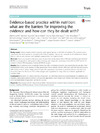Please use this identifier to cite or link to this item:
https://accedacris.ulpgc.es/jspui/handle/10553/35434
| Title: | Evidence-based practice within nutrition: what are the barriers for improving the evidence and how can they be dealt with? | Authors: | Laville, Martine Segrestin, Berenice Alligier, Maud Ruano-Rodríguez, Cristina Serra-Majem, Lluis Hiesmayr, Michael Schols, Annemie La Vecchia, Carlo Boirie, Yves Rath, Ana Neugebauer, Edmund A. M. Garattini, Silvio Bertele, Vittorio Kubiak, Christine Demotes-Mainard, Jacques Jakobsen, Janus C. Djurisic, Snezana Gluud, Christian |
UNESCO Clasification: | 3206 Ciencias de la nutrición | Keywords: | Randomised clinical trials Evidence-based clinical practice Evidence-based medicine Assessment Specific barriers, et al |
Issue Date: | 2017 | Journal: | Trials | Abstract: | Background: Evidence-based clinical research poses special barriers in the field of nutrition. The present review summarises the main barriers to research in the field of nutrition that are not common to all randomised clinical trials or trials on rare diseases and highlights opportunities for improvements. Methods: Systematic academic literature searches and internal European Clinical Research Infrastructure Network (ECRIN) communications during face-to-face meetings and telephone conferences from 2013 to 2017 within the context of the ECRIN Integrating Activity (ECRIN-IA) project. Results: Many nutrients occur in multiple forms that differ in biological activity, and several factors can alter their bioavailability which raises barriers to their assessment. These include specific difficulties with blinding procedures, with assessments of dietary intake, and with selecting appropriate outcomes as patient-centred outcomes may occur decennia into the future. The methodologies and regulations for drug trials are, however, applicable to nutrition trials. Conclusions: Research on clinical nutrition should start by collecting clinical data systematically in databases and registries. Measurable patient-centred outcomes and appropriate study designs are needed. International cooperation and multistakeholder engagement are key for success. | URI: | https://accedacris.ulpgc.es/handle/10553/35434 | ISSN: | 1745-6215 | DOI: | 10.1186/s13063-017-2160-8 | Source: | Trials [ISSN 1745-6215], v. 18, article number 425 |
| Appears in Collections: | Artículos |
SCOPUSTM
Citations
29
checked on Jun 8, 2025
WEB OF SCIENCETM
Citations
29
checked on Feb 22, 2026
Page view(s)
73
checked on Jan 11, 2026
Download(s)
86
checked on Jan 11, 2026
Google ScholarTM
Check
Altmetric
Share
Export metadata
Items in accedaCRIS are protected by copyright, with all rights reserved, unless otherwise indicated.
